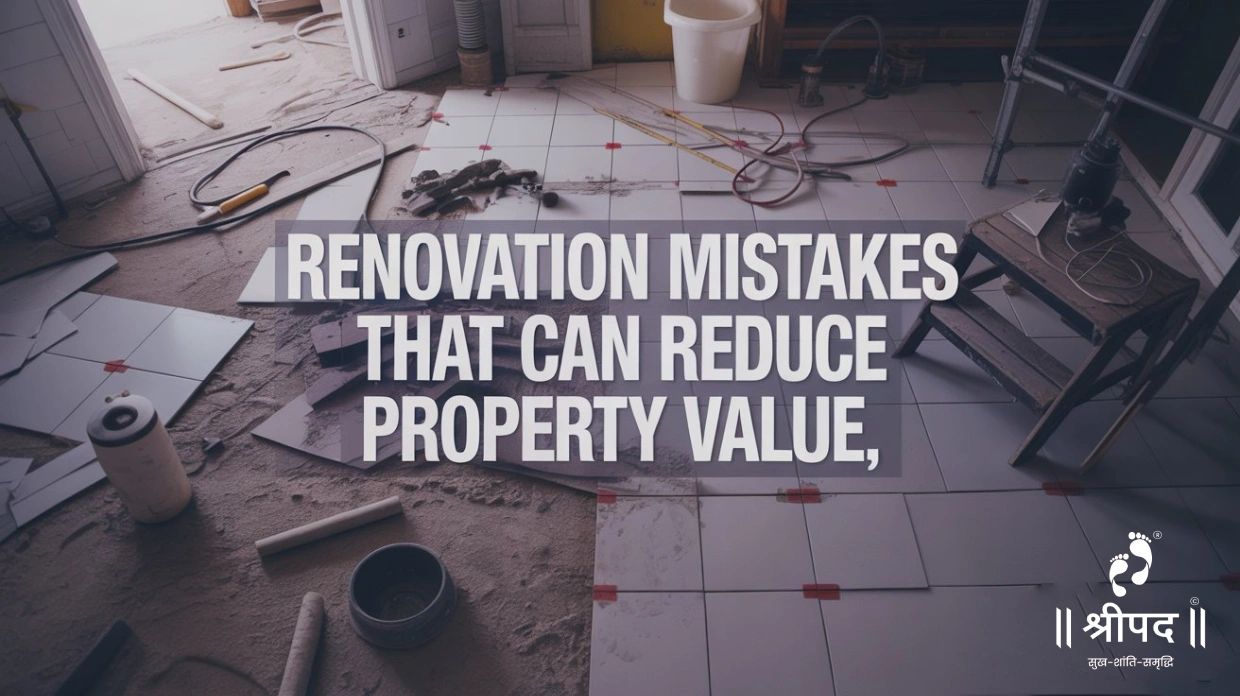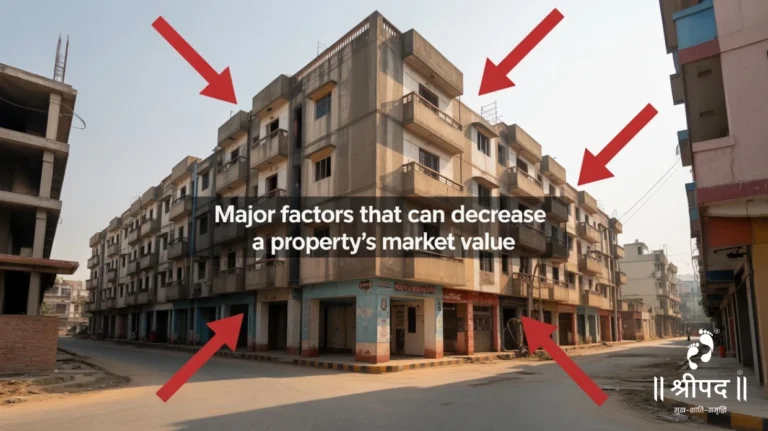- SHREEPAD GROUP
-
+91 83476 68000

Renovating a home is often seen as the best way to enhance its appeal and increase resale value. A modern kitchen, updated bathroom, or fresh landscaping can certainly make a property more desirable. However, not every upgrade adds value. In fact, some renovations may lower your property’s worth, turn off potential buyers, or fail to deliver a return on investment. For instance, poor workmanship or substandard renovations can have a significant impact of poor construction on property value, making it harder to recover costs later.
While it’s important to avoid mistakes, it’s equally crucial to focus on the top renovations that boost property value so your investment delivers long-term benefits.
This blog explores the most common renovation blunders homeowners make, how they impact property value, and the smarter alternatives you should consider.
Making Renovations Too Personal
Personal taste is important, but when it dominates your renovation choices, you risk narrowing your buyer pool. Brightly colored kitchens, unusual wall textures, or custom features that cater only to your lifestyle can discourage buyers.
Most buyers prefer clean, neutral spaces they can adapt to their preferences. Overly unique designs are often seen as costly to replace.
Pro Tip: Stick with classic finishes and neutral shades. Personal touches can be added with décor or furniture that’s easy to change.
Renovating Without Considering the Local Market
Upgrades that don’t align with neighborhood standards may actually drag your property’s value down. For instance, installing a luxury pool in an average locality can make your home stand out for the wrong reasons. Buyers might view it as overdone and overpriced compared to nearby properties. To avoid costly mistakes, it’s important to understand the factors that influence a property’s resale value before undertaking major renovations.
Pro Tip: Research local property trends. Consult a real estate professional to find out what improvements buyers in your area actually value.
DIY Projects Gone Wrong
Doing it yourself saves money—but only if the job is done right. Amateur tiling, uneven flooring, or messy electrical work signals poor quality and makes buyers question the condition of the rest of the home.
Pro Tip: Handle small cosmetic updates on your own, but hire professionals for electrical, plumbing, and structural work to ensure quality.
Using Cheap or Low-Quality Materials
Cutting costs on materials may seem like a good idea, but the results rarely last. Low-end flooring, flimsy cabinets, or peeling countertops quickly show signs of wear. Buyers will see these as immediate expenses rather than value-adding features.
Pro Tip: Opt for durable, mid-range or high-quality materials. They last longer, look better, and make your home more attractive to buyers.
Removing Essential Rooms or Spaces
In pursuit of bigger living areas, some homeowners eliminate bedrooms or garages. This often backfires, as buyers expect specific room counts and essential spaces. A missing bedroom or parking space can drastically reduce buyer interest.
Pro Tip: Expand spaces thoughtfully, but don’t compromise on bedrooms, bathrooms, or functional storage.
Overlooking Curb Appeal
The outside of your home creates the first impression. Peeling paint, broken pathways, or an untended lawn can turn buyers away before they even step inside.
Pro Tip: Keep the exterior simple and clean. A neat lawn, fresh paint, and well-maintained pathways add instant charm.
Adding Unnecessary Luxury Features
It’s tempting to go big with luxury upgrades like wine cellars, home theaters, or lavish spa bathrooms. However, these features often appeal to a limited audience and don’t provide a solid return.
Pro Tip: Focus on upgrades that matter to most buyers, such as efficient appliances, modern kitchens, or functional storage.
Poor Layout Decisions
Open layouts are trendy, but removing too many walls can disrupt functionality or reduce privacy. Similarly, awkward room arrangements—like bathrooms placed near dining areas—can lower appeal.
Pro Tip: Always prioritize functionality. Get professional advice before making major structural changes.
Skipping Permits and Approvals
Renovations without the proper permits can spell trouble. Illegal modifications often reduce value and create complications during resale. Buyers are hesitant to purchase homes with unauthorized work.
Pro Tip: Always secure necessary approvals. It ensures your renovation is safe, legal, and trustworthy to potential buyers.
Neglecting Energy Efficiency
In today’s market, eco-friendly features are a major selling point. Homes lacking insulated windows, efficient lighting, or modern HVAC systems can feel outdated and unattractive.
Pro Tip: Incorporate energy-efficient elements wherever possible. These save money over time and appeal to eco-conscious buyers.
Over-Renovating Right Before Selling
Many homeowners spend heavily on renovations just before putting the property on the market, expecting a big return. But costly upgrades like luxury kitchens or bathrooms rarely recover their full expense in resale.
Pro Tip: Focus on affordable improvements that add noticeable value—like repainting, lighting updates, or small kitchen and bathroom makeovers.
Reducing Storage Space
Storage is non-negotiable for most buyers. Removing closets or ignoring storage solutions during renovations can negatively affect desirability.
Pro Tip: Add storage wherever you can. Walk-in closets, built-in shelving, and efficient cabinetry make homes far more appealing.
Poor Lighting Choices
Lighting has a massive effect on how a home feels. Dark, dimly lit spaces are unappealing, while overly harsh lighting feels unwelcoming.
Pro Tip: Maximize natural light with bigger windows and complement it with warm, modern fixtures.
Rushed Renovation Work
Cutting corners or rushing through renovations often leads to sloppy results—crooked tiles, uneven paint, or incomplete finishes. Buyers spot these flaws instantly and question the overall quality of the home.
Pro Tip: Take your time. Quality craftsmanship always pays off in the long run.
Renovating Without Thinking About Buyers
Renovations done purely for personal preference often don’t align with what future buyers want. A home that feels too customized can limit your resale opportunities.
Pro Tip: Renovate with the buyer in mind. Simple, practical, and timeless improvements appeal to the widest audience.
Conclusion
Renovations have the power to increase property value—but only if done right. Avoiding the mistakes listed above will help you protect your investment and make your property more attractive to future buyers. Whether it’s choosing durable materials, prioritizing storage, or keeping renovations in line with the market, every decision matters.
If you’re planning a renovation or looking for your next investment, expert guidance is key. At Shreepad Group, we don’t just build premium living spaces—we help you make property decisions that truly appreciate in value.
Before you start a renovation that could hurt your home’s worth, explore better opportunities with us. Take a smarter step today and discover how you can buy property in Surat with Shreepad Group to secure a future-ready investment.
See Related News & Insights Blog

09.10.2025
How to Select the Right Property Type to Suit Your Needs
Purchasing a property is one of the most important financial decisions you can make. Whether it’s your first home, an...

09.10.2025
Essential Tips for Investing in a Growing Real Estate Market
Investing in real estate can be one of the smartest financial decisions when approached with knowledge and strategy. A thriving...

09.10.2025
Major Factors That Can Decrease a Property’s Market Value
In the real estate world, property value is more than just a number — it reflects the strength of your...

09.10.2025
Property Due Diligence Checklist for Buyers: Your Ultimate Guide
Purchasing a property is one of the biggest investments in life. Whether it’s a residential apartment, a commercial space, or...
